Blaxploitation Education: Detroit 9000
Most Blaxploitation movies are somewhat less pro-police than this one.
Detroit 9000
Written by Orville H. Hampton
Directed by Arthur Marks
1973
Here’s a Blaxploitation movie I’ve actually seen before, due to it being re-released in the 1990s under Quentin Tarantino’s Rolling Thunder Pictures imprint (I still own a copy on VHS, although finding a VCR and actually hooking it up to a TV to watch it would be much more cumbersome than finding it on one streaming channel or another). Why this, of all Blaxploitation movies, is the one Tarantino chose to feature is a question to ponder, and I suspect that it may be because it’s one that features a white lead. Not that Quentin has anything against Black people (aside from how often the N-word features in his scripts), but even in his movies that star Black characters, he makes sure to include prominent roles for white actors (Christoph Waltz in Django Unchained, Robert Forster in Jackie Brown, etc.).
There’s nothing wrong with a movie being integrated (a plot point that comes up in this one, in fact), but in a genre that’s for Black people and occasionally by Black people, it seems irksome to give a white person one of the key roles. In this case, that may have been due to the fact that the writer and director were also white, and they needed to make sure that in a racially-charged movie about the relationship between the police and the Black community in Detroit, they could feature a character who is pretty neutral on the issue. Their whiteness is probably also responsible for the other main issue with this movie, which is that it is highly sympathetic to police, portraying most of them as crusaders for justice who are just trying to navigate a difficult world and do what’s right. Most Black people would probably take issue with that portrayal, since it’s not at all reflective of their actual experiences regarding the police.
But let’s not get ahead of ourselves. The plot of the movie involves a robbery of a political rally and the attempts by the police to solve the crime and catch the perpetrators. The rally appears to involve all the major players in Black society in Detroit, with some catchy soul music performed by Laura Lee, who was involved in the Motown music scene at the time. A reverend played by Scatman Crothers gives a fiery introduction to the man of the hour: Congressman Aubrey Hale Clayton (Rudy Challenger, who previously appeared in Hit Man and Cool Breeze), who is announcing that he’s running for governor. Clayton urges everyone to donate to his campaign, and his staffers produce a large basket where all the attendees deposit money and the jewelry they’re wearing.
However, these proceedings get interrupted by a group of men wearing ski masks, who play a recording telling everyone to get down on the floor, then take all the donations and get out of there as quickly as possible, escaping with around $400,000 worth of money and jewelry. The masks they’re wearing completely cover their faces, and they also wear gloves, with the only words spoken being the tape recording. This means nobody knows their race, so when the Black community demands that the police find the culprits, everyone is left wondering where to look.
Enter our white protagonist: Lieutenant Danny Bassett (Alex Rocco, who had a long career and appeared in movies ranging from The Godfather to Herbie Goes Bananas, but I’ll always remember him as one of Bea Arthur’s boyfriends on The Golden Girls). He’s a rumpled police detective in the Columbo mold, and he’s introduced getting treatment for sinusitis at a local hospital, which leads to him regularly sniffing nasal spray throughout the movie. He complains as soon as he’s assigned to the case, knowing that whatever he finds, nobody is going to be happy. He tells his superior, “Let’s say I find out Black assholes pulled the heist; the brothers’ll claim cover-up! Let’s say the whites did it; the honkies’ll say we’re pacifying the Black community! And if I don’t crack the case, you and the department are off the hook, but I get the shaft right up my tender keister!”
However, while Bassett grumbles about his lot in life, he takes the case and does his best to solve it. He complains some more about the partner he gets saddled with though: Sergeant Jesse Williams (Hari Rhodes, who didn’t seem to do any other Blaxploitation movies, which is a shame, since he’s a solid presence here), a young, Black rising star in the department who is known more for his successful career as a college athlete than his police work. However, we learn that he’s pretty cool when he gets introduced in scene lifted straight out of Dirty Harry in which he chases down a crook who shot a police officer during a bust and, after shooting the guy, gives him a speech encouraging him to reach for his gun and give Williams an excuse to blow him away.
The movie mostly follows Bassett and Williams as they investigate the heist and try to track down the robbers (the title comes from the radio call sign of their police car). The plot is interesting enough as they follow up on various leads and encounter various setbacks, but if anything, it’s a straightforward police procedural rather than an exploration of the relationships between the police and the Black community in Detroit. The powder keg that was promised due to the community’s anger about the robbery never materializes. While some lip service is paid to police corruption, we never actually see any of it, and the worst police screw-up involves some patrol officers apprehending and shooting a guy that Bassett and Williams were watching on a stakeout, making them lose a strong lead.
If anything, the movie is more concerned about corruption in the Black community. Williams speaks to one of Congressman Clayton’s aides, who expresses his distaste for his boss’s politics. While Clayton portrays himself as someone who fights for the Black community, he’s really just out for himself, looking to make money and earn glory. This gets reaffirmed in a later scene in which a prostitute tells Williams about being hired by Clayton the night before the rally, where he and Scatman Crothers’ reverend were scheming to make a surprise announcement of his candidacy in order to get as many donations as possible. While it’s not surprising that the movie would feature a corrupt politician who is more focused on his own success than on the Black community he claims to be fighting for, there’s no indication of any other Black leaders who may serve as a more positive influence, or even any discussions about what concerns Black people in Detroit may have about anything that affects their lives.
So what we have here is a pretty basic crime story that feints at having something to say about race relations but never actually gets there. The closest it comes are some occasional quips that Bennett and Williams fire back and forth, such as Bennett saying “I always thought you spades were like, perpetual humping machines,” and Williams responding by saying “Is that why White chicks been chasing us all these years?” There’s also a scene in which Bennett visits his wife, who is a patient in a sanitarium, and her mental health issues seem to be related to the fact that she can’t stand to live around Black people (it doesn’t help that most of the nurses and attendants in the facility are Black). Bennett doesn’t seem too bothered by her racism; he’s more upset that he doesn’t have enough money to either move her to a more exclusive private healthcare facility or buy a house in a community that’s more to her liking. I suppose this could be an indication that he has implicitly accepted the racist attitudes shared by most of his people, but based on his interactions with Black people throughout the movie (aside from the occasional slur like the one mentioned above, which is portrayed as good-natured joshing with a colleague), the film takes pains to portray him as just about the least racist white cop out there.
Eventually, the cops get some information at a local brothel that points them toward a prostitute named Roby (Vonetta McGee, who we’ve previously seen in movies like Melinda and Hammer) and a pimp named Ferdy (Herbert Jefferson, Jr., who was in a couple Blaxploitation movies like Black Gunn, but is probably best known as Lieutenant Boomer on the original Battlestar Galactica). When they eventually track down the robbers, this leads to an extended series of chase scenes and shootouts as what seem like dozens of police go after the perpetrators. There’s also some intrigue about who may have run off with the loot, which leads to some drama between Bennett and Williams, but by that point, it’s just one more twist that doesn’t really tie in to what I was hoping to get out of this enterprise.
For a movie that’s ostensibly about a Black community that’s perpetually on the verge of violence during an era of racial turmoil, we see precious little of that in this movie. Ultimately, it’s too pro-cop to have anything of value to say, and the movie even ends with an on-screen title thanking the City of Detroit and the Detroit Police Department for their assistance in making the movie. A real Blaxploitation movie should focus on the actual concerns of the Black community, which include mistreatment by police, racism in the justice system, and the failure of the system to actually protect people from crime, drugs, and violence. Copaganda and Blaxploitation don’t go together very well, and even if this movie is probably the best possible outcome of trying to combine those warring perspectives, what with its exciting action and catchy soundtrack, it’s still kind of empty and disappointing. If they had let some Black filmmakers tell this story, I expect they would have gotten very different results.
Blaxploitation Education index:
UpTight
Cotton Comes to Harlem
Watermelon Man
The Big Doll House
Shaft
Sweet Sweetback’s Baadasssss Song
Super Fly
Buck and the Preacher
Blacula
Cool Breeze
Melinda
Slaughter
Hammer
Trouble Man
Hit Man
Black Gunn
Bone
Top of the Heap
Across 110th Street
The Legend of N***** Charley
Don’t Play Us Cheap
Shaft’s Big Score!
Non-Blaxploitation: Sounder and Lady Sings the Blues
Trick Baby
The Harder They Come
Black Mama, White Mama
Black Caesar
The Mack
Book of Numbers
Charley One-Eye
Ganja & Hess
Savage!
Coffy
Shaft in Africa
Super Fly T.N.T.
Scream Blacula Scream
Cleopatra Jones
Terminal Island
Gordon’s War
Slaughter’s Big Rip-Off!

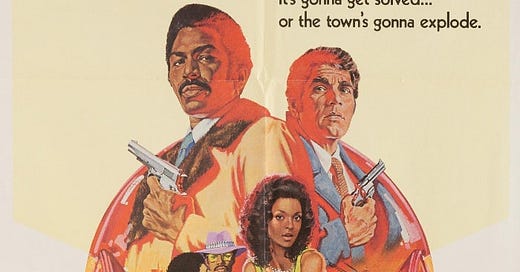



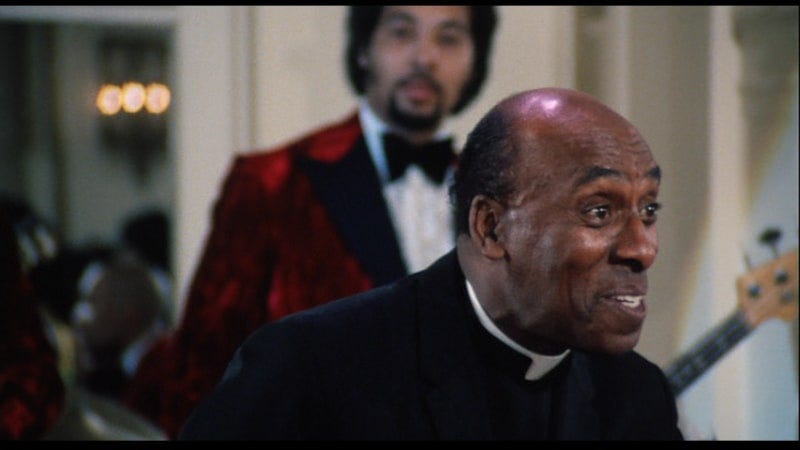

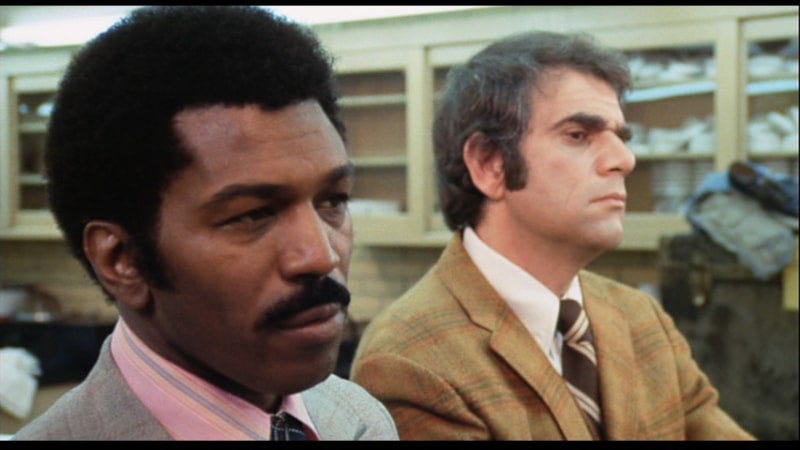
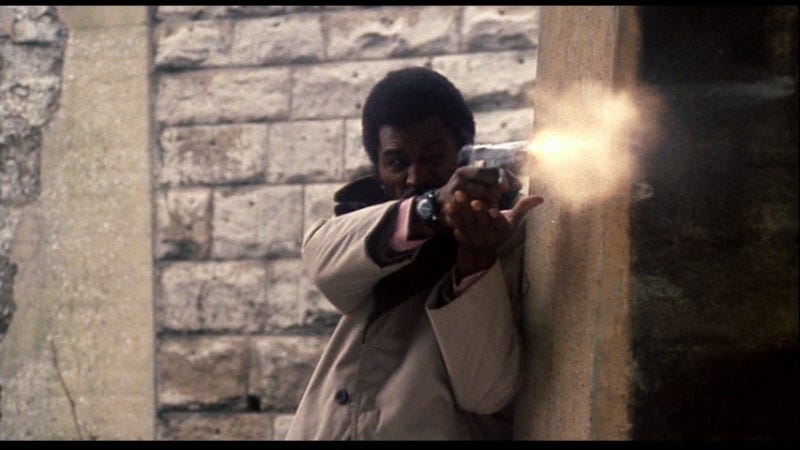
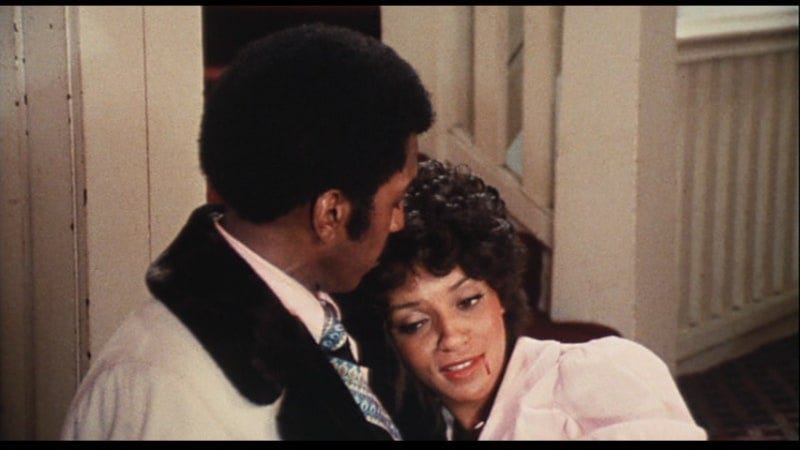
If they wanted to make a movie about racial conflict and uprising in Detroit, they would have made one about the disastrous 1967 riots that blighted the city's reputation for many years (as with the more recent film "Detroit"). But they clearly weren't interested in going too deep.
Fact: Orville Hampton received an Oscar nomination for the script of "One Potato, Two Potato", another film dealing with American race relations.